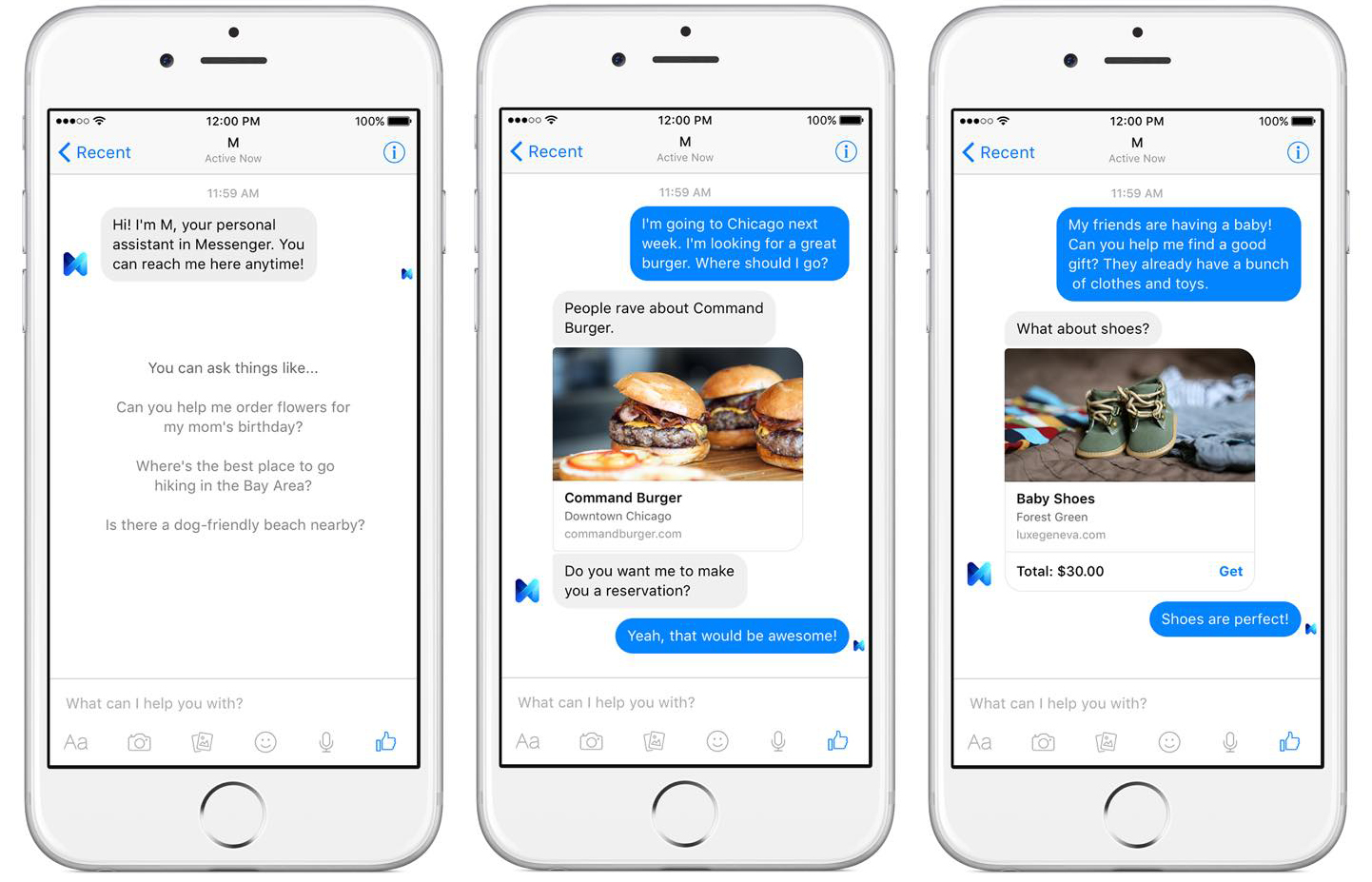Your guide to tech-driven changes in the media landscape by IPG Media Lab. A fast read for you and a forward for your clients and team.
• Facebook started testing its own improved, human-assisted version of Siri
• More than just making suggestions, it will also complete tasks on users’ behalf
• Brands need to explore the new functional layer that many messaging apps are adding to their platform for transactions, customer service, and reaching new customer
What Facebook Announced
Over a month after initial reports suggesting Facebook started preparing a human-staffed personal assistant service, the social network announced on Wednesday that it has started testing a new service for its Messenger mobile chat app called M that handles user queries and requests in a text-based interface that looks similar to other conversations on the platform. The service is currently available for a few hundred users in the Bay Area, and will eventually be rolled out to all Messenger users.
Unlike rival virtual assistants Apple’s Siri, Microsoft’s Cortana, or Google’s Google Now, Facebook claims that M will take it one step further and actually complete tasks on users’ behalf, such as purchasing items, getting gifts delivered, booking restaurants, making travel arrangements and appointments, and more. In addition to AI-powered responses, Facebook also has a team of so-called “M trainers” to handle the requests that AI can’t, ensuring all requests are answered properly.

What Brands Need To Do
• Reach customers on apps they’re already using – in this case, Facebook Messenger
• Take advantage of emerging platforms with messaging-based customer service
• Prepare for a new version of SEO to conquer the prime space in AI-generated suggestions
At a time when the U.S. market is finally catching up with the Asian market in discovering messaging apps’ great potential as a commerce platforms, Facebook is looking to take initiative in a nascent ecosystem that brands of all types could benefit greatly from. It is time to start expanding your customer service from phone call-based to include text-based messaging, reaching consumers on the platforms they already use.
As of now, Facebook seems to be deliberately keeping M neutral and completely devoid of “opinions”, i.e. whether something is good or not. Instead, it merely presents all available options as generated by algorithms. While this approach may not seem too welcoming for brand integrations, we are optimistic that Facebook would open up M for sponsored content and branded recommendations in the near future, given Facebook’s trajectory in making Messenger’s platform more brand-friendly so far. And brands need to be ready for what could essentially be a updated version of SEO (Search Engine Optimization) that plays around AI algorithms to make sure their content shows up in advantageous positions in M’s recommendations.
Market Impact
M will certainly face some tough competitions: Amazon unbundled its virtual assistant Alexa from its smart speaker Echo in June; Microsoft has launched Cortana on new platforms; and Apple is reportedly integrating Siri into its updated Apple TV for voice command. But unlike other virtual assistants, Facebook M holds the advantage of being a hybrid of AI and real-human touches. Boasting over 700 million monthly users and still growing, Facebook Messenger has been actively adding new brand-friendly features to integrate businesses into its platform, clearly aiming to become go-to place for mobile discovery and customer service. Moreover, it bucks the convention of being voice-activated, and instead is text-based. Given the flexibility of conversational UI, however, it seems reasonable to expect Facebook M to adopt speech command down the road as an option, just as its competitors could easily move to texts-based communications to best suit user’s’ needs.
In recent months, we have seen some messaging apps adding a “functional layer” on top of its chatting features to connect customers to businesses. For example, popular Chinese messaging app WeChat has been actively onboarding certified brand accounts to expand the functionality of its messaging platform, to some great success. Similarly, apps like Kik, Vurb, Path, and Tango all updated their platform to add features that seek to connect users to businesses and brands via chat or in-app shops. On the other end of the spectrum, there is Magic, a startup that promises to fulfill any legal request that users send via texts, and employs real humans to handle those requests. Other similar texting-based on-demand service includes Operator, helpa, and the travel-focused Pana. Everywhere we look, the major tech companies are expanding their platforms with business-friendly features that aims to connect consumers with brands in a natural, conversational context.
For More Information
Please contact Engagement Director Samantha Holland ([email protected]) at the IPG Media Lab if you would like more detail or to schedule a visit to the Lab to discuss strategies and tactics around tapping into the marketing potential of virtual personal assistants and conversational UI..
For previous editions of Fast Forward, please visit ipglab.com. Please reply with any constructive criticism or feedback. We want these to be as useful as possible for you and your clients, and your feedback will help us immensely.

